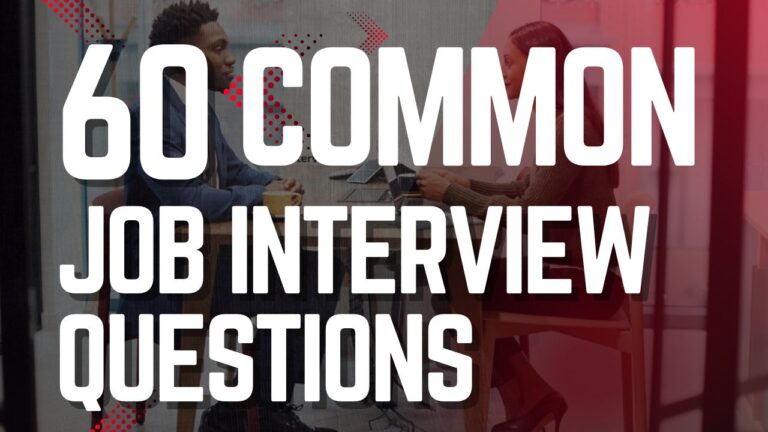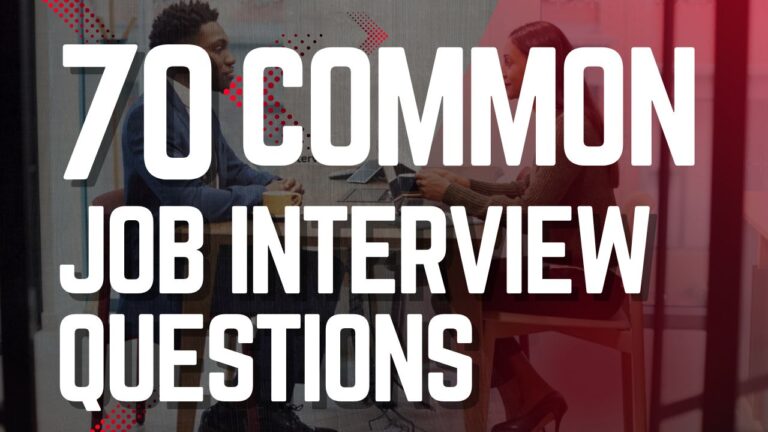120 Interview Questions Charles Schwab Corporation: Essential Insights and Preparation Tips

Preparing for an interview at Charles Schwab Corporation? You’re in the right place. Navigating through the hiring process can be daunting, but understanding the potential questions can make a big difference.
If you are planning to apply for Job posting at Charles Schwab Corporation. This is the right place for you to get the details.
This guide provides you with 120 expected interview questions for Charles Schwab Corporation to help you confidently tackle each stage of the interview process.

Charles Schwab Corporation is a leader in financial services, and their interview process can be competitive. Knowing what to expect can set you apart from other candidates. This post covers some Questions which may be asked in the interview Process.
You’ll encounter questions that test both your technical skills and your understanding of the company’s values.
By exploring these questions, you’ll gain valuable insights into what Charles Schwab hires for. This preparation not only boosts your confidence but also allows you to present your best self in interviews. Ready to make a strong impression?
Let these questions guide your preparation for the Interview.
Preparing for the Interview

Getting ready for a job with Charles Schwab Corporation means focusing on three main areas. Start by crafting a sharp resume that highlights your skills and experience. Next, dig deep into the job description to understand what the company needs. Also, think about interview questions you might face, especially for roles like financial analyst or advisor.
Crafting Your Resume
A resume is your first impression, so make it count. Highlight your skills in finance, analysis, and advising. If you aim for a financial analyst position, showcase any experience with investments and market research. Use bullet points to keep it neat.
Include keywords from the job description. This might mean mentioning tools like Excel, financial modeling, or portfolio management.
Tailor your resume to Charles Schwab Corporation by reflecting their values in your past roles. Make sure your contact info is bold and easy to read.
Understanding the Job Description
Job description help you know what Charles Schwab wants. Are they looking for skills in portfolio management or client advising? Make a list of key duties mentioned.
Research the company to understand how the role fits into bigger goals.
For example, if applying for an investment analyst role, know how that impacts clients and the company’s growth. This knowledge helps during interviews to tie your skills to their needs.
Anticipating Interview Questions
Thinking ahead about interview questions can make you feel more prepared. Expect queries about your experience with financial tools, problem-solving abilities, and teamwork. Practice answers about managing projects or advising clients.
Be ready for questions specific to Charles Schwab, such as how you would handle market changes. Review common interview questions for roles like financial analyst or advisor.
This might include discussing past performance, client interactions, or strategic decisions you’ve made.
Types of Interview Questions

Interviews at Charles Schwab Corporation often include a variety of questions to assess different skills. You may encounter customer service, behavioral, and client scenario questions that evaluate your expertise in financial planning and client relations.
Customer Service Questions
Customer service questions focus on your ability to interact with clients and handle their inquiries effectively. Strong communication and problem-solving abilities are essential.
- Describe a time you went above and beyond for a customer.
- How do you handle a dissatisfied client?
- Explain how you would assist a client investing for the first time.
- What steps would you take if a client received incorrect account information?
- How do you prioritize urgent client requests?
- How do you keep customers informed about market trends?
- Describe an experience where you resolved a client’s issue quickly.
- How do you maintain client trust when discussing financial news?
- Explain how you educate clients on investment strategies.
- How would you describe Schwab’s customer service philosophy?
Behavioral Questions
Behavioral questions are designed to understand how you act in various situations.
- Tell me about a challenge you faced and how you dealt with it.
- Describe a time you made a difficult decision at work.
- Share an instance when you had to learn a new technical skill quickly.
- How do you manage stress when handling client accounts?
- Give an example of using the working method in a past role.
- Describe a teamwork experience that led to a successful financial plan.
- How have you adapted to changes in financial regulations?
- Tell me about a time you predicted a market trend early.
- Share an experience where you had to persuade a client.
- Describe how you handled a mistake you made professionally.
Client Scenario Questions
Client scenario questions evaluate how you approach real-life situations involving clients. This tests your problem-solving and client relations skills.
- A client is upset about a portfolio’s decline; how do you respond?
- How would you recommend adjusting a portfolio during market volatility?
- Explain a situation where a client needed urgent funds from their account.
- How do you handle a client questioning your financial planning suggestions?
- What do you do if a client misses a major financial milestone?
- Describe your approach to building a diversified investment strategy for a cautious investor.
- How do you deal with a client influenced by incorrect financial news?
- Explain how you’d assist a client targeting long-term wealth accumulation.
- How would you adjust planning for a client nearing retirement age?
- Describe a client scenario where you utilized technical skills effectively.
List of 120 Interview Questions Charles Schwab Corporation

Preparing for an interview at Charles Schwab Corporation can be crucial for success. This set of 120 questions can guide you through the process.
Start by focusing on the interview experience. Think about possible questions involving your past roles and what you’ve learned from them. Be ready to discuss challenges and achievements.
Career goals are often a topic in interviews. Be clear about your long-term goals and how they align with the company’s vision. Think about how this role can help you grow in your career path.
When discussing discovery, show how eager you are to learn new skills. Share examples of when you explored new areas or took on responsibilities outside of your comfort zone.
Interview tips can help you shine. Practice common questions and answers with friends or mentors. Dress appropriately and show confidence during the interview. Listen carefully to questions and take a moment before responding.
- Tell me about yourself.
- I have a background in finance with a degree in Economics from XYZ University. I started my career in investment analysis and have spent the last five years working with clients to develop tailored investment strategies. I am passionate about helping clients achieve their financial goals and continuously improving my knowledge of market trends.
- Why do you want to work for Charles Schwab?
- I admire Charles Schwab’s commitment to client-centric services and its innovative approach to investing. The company’s focus on transparency and education aligns with my values, and I want to be part of a team that prioritizes clients’ best interests.
- What do you know about our company?
- Charles Schwab is a leading financial services firm known for its low-cost investment options, comprehensive wealth management services, and commitment to client education. The company has a strong reputation for innovation and has been a pioneer in the brokerage industry.
- Describe your understanding of investment products.
- Investment products include a variety of financial instruments such as stocks, bonds, mutual funds, ETFs, and alternative investments. Each product has its own risk and return characteristics, and I believe it’s essential to match these products with clients’ financial goals and risk tolerance.
- How do you stay informed about market trends?
- I regularly read financial news from reputable sources, follow market analysts on social media, and participate in webinars and industry conferences. Additionally, I subscribe to financial journals to gain deeper insights into market dynamics.
- What is your investment philosophy?
- My investment philosophy centers around a long-term approach, focusing on diversification and asset allocation to manage risk. I believe in tailoring investment strategies to meet individual client needs while considering their risk tolerance and financial goals.
- Can you explain the difference between stocks and bonds?
- Stocks represent ownership in a company and can provide capital appreciation and dividends, while bonds are debt instruments where investors lend money to an issuer in exchange for periodic interest payments and the return of principal at maturity. Stocks typically have higher risk and potential return, while bonds are generally considered safer but with lower returns.
- How do you assess a company’s financial health?
- I analyze key financial statements, including the income statement, balance sheet, and cash flow statement. I look at metrics like revenue growth, profit margins, debt levels, and cash flow to evaluate a company’s performance and stability.
- Describe a time when you made a difficult investment decision.
- I once had to recommend selling a stock that had been underperforming for a client. I conducted thorough research and presented the data showing that the company’s fundamentals were weakening. While it was a tough conversation, the client appreciated my honesty and ultimately agreed with my recommendation.
- What is your experience with financial modeling?
- I have built financial models for various purposes, including valuation analysis, forecasting, and scenario analysis. I am proficient in Excel and use it to create dynamic models that help in decision-making processes.
- How do you handle client objections?
- I listen carefully to the client’s concerns, validate their feelings, and provide data-driven responses. I strive to educate them about the investment strategy and how it aligns with their goals, which often helps in alleviating their objections.
- Describe a time you worked in a team to achieve a goal.
- In my previous role, I collaborated with a team to launch a new investment product. We held brainstorming sessions to gather ideas, divided responsibilities based on expertise, and successfully launched the product on time, exceeding our sales targets in the first quarter.
- What role does diversification play in an investment portfolio?
- Diversification helps to spread risk across different asset classes and sectors, reducing the impact of any single investment’s poor performance on the overall portfolio. It is a key strategy to enhance returns while managing risk.
- How do you prioritize your tasks in a fast-paced environment?
- I use a combination of to-do lists and project management tools to organize my tasks based on deadlines and importance. I also regularly reassess my priorities to ensure I am focusing on the most impactful activities.
- Explain the concept of risk tolerance.
- Risk tolerance refers to an investor’s ability and willingness to endure fluctuations in the value of their investments. It is influenced by factors such as investment goals, time horizon, and individual comfort with market volatility.
- How do you approach building a client relationship?
- I believe in establishing trust through open communication and transparency. I take the time to understand my clients’ needs and goals, and I make it a point to follow up regularly to ensure they feel supported and informed.
- What software tools are you familiar with for analysis?
- I am proficient in Excel for financial modeling, Bloomberg for market data analysis, and various CRM tools for managing client relationships. I also have experience using financial planning software.
- Can you explain the importance of asset allocation?
- Asset allocation is crucial because it determines how an investment portfolio is divided among different asset classes. A well-thought-out allocation strategy can help optimize returns while managing risk according to an investor’s goals and risk tolerance.
- Describe a time when you had to analyze a large amount of data.
- In a previous project, I was tasked with analyzing historical performance data for a range of mutual funds. I used Excel to sort and filter the data, identifying trends and insights that helped guide our investment recommendations.
- How would you explain a complex investment concept to a client?
- I would break the concept down into simpler terms, using analogies or examples that relate to the client’s experiences. Visual aids like charts or graphs can also help illustrate the concept more clearly.
- What strategies do you use for long-term investing?
- I focus on a buy-and-hold strategy, emphasizing quality investments with strong fundamentals. I also regularly review the portfolio to ensure it aligns with the client’s goals and adjust as necessary based on market conditions.
- How do you handle stress and pressure?
- I manage stress by staying organized and maintaining a healthy work-life balance. I prioritize tasks and take breaks when needed to recharge. Practicing mindfulness techniques also helps me stay focused under pressure.
- What are your thoughts on ESG (Environmental, Social, Governance) investing?
- I believe ESG investing is increasingly important as more investors seek to align their portfolios with their values. It can also lead to better long-term performance, as companies with strong ESG practices often demonstrate lower risk and greater resilience.
- Describe a time when you had to adapt to change quickly.
- When my previous company underwent a major software transition, I had to quickly learn the new system and train my colleagues. I dedicated extra hours to mastering the software and created a guide to help others adapt, which facilitated a smoother transition.
- How do you evaluate investment opportunities?
- I conduct thorough research, analyzing financial statements, market conditions, and industry trends. I also consider qualitative factors, such as management quality and competitive positioning, to assess the potential risks and rewards.
- What is your experience with retirement accounts?
- I have helped clients establish and manage various retirement accounts, including IRAs and 401(k)s. I emphasize the importance of tax efficiency and long-term growth strategies tailored to each client’s retirement goals.
- How do you keep clients informed about their investments?
- Describe your experience with financial regulations and compliance.
- What motivates you in your work?
- How do you handle failure or setbacks?
- Explain the difference between active and passive investing.
- How do you measure investment performance?
- What is your understanding of market volatility?
- Describe a time when you had to persuade someone to see your point of view.
- How do you approach client education?
- What are your career goals in the investment field?
- How do you ensure accuracy in your work?
- What is your experience with portfolio management?
- Can you explain the concept of compound interest?
- How do you approach networking within the industry?
- What is your understanding of behavioral finance?
- Describe your experience with investment research.
- How do you handle difficult clients?
- What do you think are the biggest challenges in the investment industry today?
- How do you ensure compliance with financial regulations?
- Describe a successful investment strategy you have implemented.
- What is your experience with trading platforms?
- How do you assess market trends?
- What role does technology play in your investment approach?
- How do you handle competing priorities?
- Describe a time you had to work under a tight deadline.
- What is your experience with international investments?
- How do you evaluate the performance of a mutual fund?
- What are your thoughts on cryptocurrency as an investment?
- How do you maintain work-life balance?
- Describe a time when you had to learn something new quickly.
- How do you approach risk management?
- What are the key factors you consider when analyzing a stock?
- Describe your experience with client relationship management.
- What do you think sets Charles Schwab apart from its competitors?
- How do you handle feedback and criticism?
- What is your experience with fixed-income securities?
- How do you approach goal-setting for your clients?
- Describe a time when you exceeded a client’s expectations.
- What are your thoughts on market timing?
- How do you ensure that you are meeting client needs?
- Describe your experience with financial planning.
- What is your understanding of the fiduciary standard?
- How do you approach continuing education in finance?
- What is your experience with tax-efficient investing?
- How do you manage client expectations?
- Describe a time when you had to resolve a conflict.
- What are your thoughts on robo-advisors?
- How do you assess a client’s financial goals?
- Describe your experience with alternative investments.
- What is your understanding of derivatives?
- How do you approach ethical investing?
- Describe a time when you had to deliver bad news to a client.
- What are your views on the current economic climate?
- How do you approach mentorship and collaboration?
- What is your experience with financial forecasting?
- How do you handle a situation where a client disagrees with your recommendation?
- Describe your experience with investment seminars or workshops.
- What is your understanding of the role of the SEC?
- How do you build trust with clients?
- What are your thoughts on the importance of financial literacy?
- How do you evaluate the credibility of financial information?
- Describe a time when you had to make a decision with limited information.
- What is your experience with performance reporting?
- How do you approach client segmentation?
- What are your thoughts on the future of the investment industry?
- Describe your experience with wealth management.
- How do you handle a high-stakes investment decision?
- What is your understanding of financial derivatives?
- How do you keep your skills sharp in the investment field?
- Describe your experience with compliance audits.
- What is your approach to conducting due diligence?
- How do you evaluate a financial advisor’s performance?
- What are your views on the importance of a diversified portfolio?
- Describe your experience with retirement planning.
- How do you approach client retention?
- What is your understanding of market cycles?
- How do you handle a situation where a client is unhappy with their investment performance?
- Describe your experience with financial reporting.
- What strategies do you use for managing a client’s risk?
- How do you approach investment research?
- What are your thoughts on the role of technology in investing?
- Describe a time when you had to educate a client about a complex topic.
- What is your experience with financial statements?
- How do you approach client onboarding?
- What are your views on the importance of ethical standards in finance?
- How do you handle a situation where a client wants to take on more risk than is advisable?
- Describe your experience with market analysis.
- What is your understanding of the impact of interest rates on investments?
- How do you approach creating a financial plan for a client?
- What are your thoughts on the importance of transparency in investing?
- Describe your experience with investment committees.
- How do you stay organized in your work?
- What is your understanding of the role of a financial advisor?
- How do you approach professional development in your career?
Prepare in advance, stay calm, and focus on delivering your best self. Remember, interviews are a chance to showcase your skills and potential. Happy preparing!
Frequently Asked Questions: Charles Schwab Corporation

You might want to understand how best to approach your interview, including what to wear and what questions you may face. Knowing the typical process and preparing well can help you feel more confident.
How should one prepare for a Charles Schwab Corporation interview?
Research the company and its values. Practice common interview questions. Prepare examples of past experiences that highlight your skills. Be ready to discuss how you can contribute to the company’s goals.
What are common interview questions for an Associate position at Charles Schwab?
Expect questions about technical skills, problem-solving abilities, and past projects. You might be asked about specific technologies you’re familiar with. They may inquire about your teamwork experience and how you handle tight deadlines.
What can candidates expect during the Charles Schwab onboarding process?
The onboarding process usually involves orientation, training sessions, and meeting your team. You will likely complete necessary paperwork and receive important information about company policies and benefits.

What are some tips for dressing appropriately for a Charles Schwab interview?
Dress in business professional attire. A suit or a conservative dress is usually appropriate. Make sure your clothes are clean and pressed. Pay attention to personal grooming, as it can impact the impression you make.
How many rounds of interviews are typically involved in the hiring process at Charles Schwab?
The hiring process often includes two to three interview rounds. These may consist of an initial phone screen, followed by in-person or virtual interviews.
Be prepared for multiple stages, as this is common in many companies.
What motivates candidates to want to work at Charles Schwab Corporation?
Candidates are often drawn to the company for its reputation, growth opportunities, and positive work environment. Schwab’s commitment to client service and innovation can be appealing.
Many appreciate the company’s focus on career development and work-life balance.
Note: These are the expected questions for the Interview. This list will help to prepare for the type of Questions generally asked in the interview process.
All the Best !






